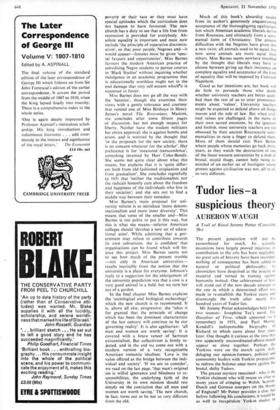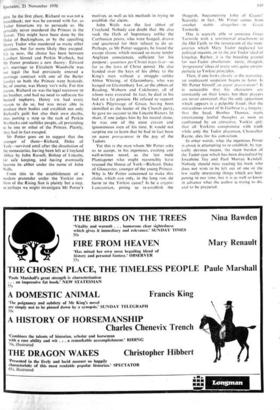Tudor lies — a suspicious theory
AUBERON WAUGH
A Trail of Blood Jeremy Potter (Constable 38s) The present generation will not be remembered for much. Its scientific inventions have largely proved injurious: its contribution to the arts has been negligible: no great acts of bravery have been recorded: nothing of consequence has been added to natural or political philosophy; its chroniclers have despaired at the paucity of material and turned to ranting against humanity instead. One achievement at least will stand out if the new decade emerges as the one in which a determined effort was made to re-establish the Yorkist cause and disentangle the truth after nearly tile hundred years of Tudor lies.
Mr Jeremy Potter acknowledges help from two sources: Josephine Tey's novel. The Daughter of Time, which appeared (as I remember) in 1951, and Paul Murray Kendall's indispensable biography of Richard in which came about four years later. One thought it curious at the time that two apparently uncoordinated efforts should appear so close together Perhaps the Yorkists were on the march again. (lath' deluging our opinion-formers, political and community leaders with Yorkist propaganda to redress the balance once more against the brutal, shifty Tudors.
The greater mystery remained : who is the Yorkist claimant who will rescue us after so many years of cringing to Welsh. Scottish. Dutch and German usurpers on the throne of England? Mr Potter provides a clue. but before following his conclusions, it would be as well to recapitulate Yorkist studies 10 date. In the first place, Richard tit was not a hunchback; nor was he covered with fur, as Tudor historians try to persuade us. He certainly never murdered the Princes in the Tower. This might have been done by the Duke of Buckingham, or by the appalling Henry Tudor who murdered so many other relations, but far more likely they escaped. Up to now, the choice has been between Lambert Simnel and Perkin Warbeck, but Mr Potter produces a new theory: Edward iv's marriage to Elizabeth Woodville was not legal (he had previously entered a marriage contract with one of the Butler family) so both the Princes were bastards. So. of course, was Henry vies wife. For this reason, Richard ill was the legal successor to his brother, and had no need to suffocate his bastard nephews. Henry via . had every reason to do so, but was never able to produce their bodies and establish not only Richard's guilt but also their own deaths, thus putting a stop to the rash of Perkin Warbecks and suchlike people, all pretending to be one or other of the Princes. Plainly, they had in fact escaped.
Mr Potter goes on to suggest that the younger of them—Richard, Duke of York--survived until after the dissolution of the monasteries, having been left at Croyland Abbey by John Russell, Bishop of Lincoln, for safe keeping, and having eventually become its abbot under the name of John Wells.
From this to the establishment of a modern pretender under- the Yorkist em- blem of the Rising Sun is plainly but a step, so perhaps we might investigate Mr Potter's motives, as well as his methods in trying to establish the claim.
John Wells was the last abbot of Croyland. Nobody can doubt that. He also took the Oath of Supremacy unlike the Carthusian priors, who were hanged, drawn and quartered for their refusal to do so. Perhaps, as Mr Potter suggests, he found the escape clause, which rescued so many tender Anglican consciences, sufficient for his purpose: quantum per Christi leges licet--so far as the laws of Christ permit. He also handed over the keys of his abbey to the King's men without a struggle—unlike Abbot Whiting, of Glastonbury, who was hanged on Glastonbury Tor, or the abbots of Reading, Woburn and Colchester, all of whom were executed. In fact, he died in his bed on a fat pension. He refused to support Aske's Pilgrimage of Grace, having been identified as the•Ieader of the Church party, he gave no succour to the Lincoln Rioters. In short, if one judges him by his record alone, he was one of the most craven and ignominious men of his time. It would not surprise me to learn that he had in fact been an agent provocateur in the pay of the Tudors.
Yet this is the man whom Mr Potter asks us to accept, in his ingenious, exciting and well-written novel, as the last male Plantagenet who might reasonably have rescued the House of York—Richard, Duke of Gloucester, younger of the young Princes. Why is Mr Potter concerned to make this claim, which can only, in the long run, do harm to the Yorkist cause? Is he a crypto- Lancastrian, pining to re-establish the thuggish. buccaneering John of Gaunt? Scarcely; in fact, Mr Potter comes from another stable altogether--in Great Turnstile.
One is scarcely able to associate Great Turnstile with a sentimental attachment to the Old Faith, to the restoration of the mon- asteries which Mary Tudor neglected for political reasons, or to the pre-Tudor ideal of kingship. Rather, it is the breeding ground for neo-Tudor absolutism : nasty. thuggish. `progressive' ideas of every sort, quite unsym- pathetic to Yorkist prinoiples.
Then. if one looks closely at the narrative. an unpleasant suspicion begins to form. Is Mr Potter himself an agent provocateur? It is noticeable that his characters are constantly on their knees, but their prayers are never answered: that the only apparition which appears is a palpable fraud; that the miraculous sword of St Guthrae is a forgery; that the head, Brother Thomas, starts entertaining lustful thoughts as soon as confronted by an attractive, Yorkist girl; that all Yorkists compromise with truth while only the Tudor placeman, Chancellor Rayne, dies for his conviction.
In other words, what the ingenious Potter is about is attempting to re-establish, by typ- ically devious means, the main burden of the Tudor case which has been discredited by Josephine Tey and Paul Murray Kendall.
Nobody should miss reading his book who does not wish to he left out of one of the few really interesting things which are hap- pening in our time, but it is as well to know in advance what the author is trying to do, and to be prepared.















































 Previous page
Previous page